What Essential Oils Keep Bugs Away
Are you tired of dealing with pesky bugs invading your space?
Essential oils may be the solution you’re looking for!
In this article, we’ll explore do essential oils keep wasps away and how they can effectively repel bugs.
Discover the best essential oils for keeping bugs at bay, along with creative ways to use them.
We’ll also discuss the safety precautions to keep in mind when using essential oils for bug repellent, as well as other natural methods to keep bugs away.
Say goodbye to bugs with the power of essential oils!
Key Takeaways:
What Are Essential Oils?
Essential oils are highly concentrated extracts derived from plants that contain the natural aromatic compounds of the source plant. These oils are commonly used in aromatherapy, natural remedies, and beauty products due to their potent properties.
The process of extracting essential oils involves various methods such as steam distillation, cold pressing, or solvent extraction, depending on the plant type and desired oil. Each method ensures that the pure essence of the plant is captured, resulting in a powerful and concentrated oil that retains the plant’s unique fragrance and therapeutic benefits.
Essential oils are known for their versatile uses, including stress relief, skin care, hair treatments, and even household cleaning. Their natural origins make them a popular choice for those seeking holistic and plant-based alternatives to synthetic products.
How Do Essential Oils Repel Bugs?
Essential oils repel bugs through their potent scent that insects find unpleasant or overwhelming. These natural compounds disrupt the insects’ sensory receptors, making it difficult for bugs like mosquitoes, fleas, ticks, and flies to locate and feed on hosts.
Among the most common essential oils used for insect repellent purposes are lavender and peppermint. Lavender oil, with its calming fragrance for humans, has a contrary effect on insects, acting as a potent deterrent. Peppermint oil, on the other hand, has a strong minty scent that bugs find unbearable. These oils not only mask the scents that attract insects but also interfere with their ability to detect prey or hosts.
What Are the Best Essential Oils for Repelling Bugs?
In terms of repelling bugs naturally, certain essential oils have proven to be highly effective. Citronella, lemon eucalyptus, peppermint, lavender, and tea tree oil are among the best choices for creating insect-repelling solutions.
- Citronella oil: Known for its strong scent that masks human odors, citronella is a powerful mosquito repellent. It can be used in candles, sprays, or diffusers to keep these pesky insects at bay.
- Lemon eucalyptus oil: Effective against mosquitoes and ticks, this oil contains citronellal, a compound known for its insect-repelling properties. It’s commonly used in sprays and lotions for outdoor protection.
- Peppermint oil: With its fresh aroma, peppermint oil deters flies and ants. Simply dilute it with water and spray around entry points to keep bugs away.
- Lavender oil: Not only does lavender oil have a calming effect, but it also repels mosquitoes and moths. Place a few drops on fabric items or use it in a diffuser for bug protection.
- Tea tree oil: Known for its antiseptic properties, tea tree oil can also ward off insects like ants and fleas. Mix it with water and spray in areas where pests are common.
Citronella Essential Oil
Citronella essential oil is a popular natural insect repellent known for its strong citrus-like fragrance that deters mosquitoes and other flying insects. This oil is commonly used in candles, sprays, and lotions to create bug-free environments.
Citronella oil is extracted from the leaves and stems of the citronella plant, a hardy perennial that thrives in tropical regions. Its effectiveness against mosquitoes is due to its high citronellal and geraniol content, which disrupts the insects’ ability to locate their prey through smell.
Citronella essential oil is non-toxic to humans and pets, making it a safer alternative to chemical insect repellents. Besides repelling mosquitoes, citronella-based products can also ward off flies, ants, and other pests.
Lemon Eucalyptus Essential Oil
Lemon eucalyptus essential oil is a powerful insect repellent that offers protection against mosquitoes and other biting bugs. Its refreshing scent and bug-deterring properties make it a popular choice for outdoor activities.
One of the key advantages of using lemon eucalyptus essential oil is that it is a natural alternative to chemical-based repellents, making it suitable for individuals with sensitivities. This oil not only repels insects but also has antimicrobial properties, which can aid in wound healing. To make a DIY bug spray, mix lemon eucalyptus oil with a carrier oil like jojoba or coconut oil in a spray bottle. Apply this mixture on exposed skin before heading outdoors to enjoy its bug-repelling benefits.
Peppermint Essential Oil
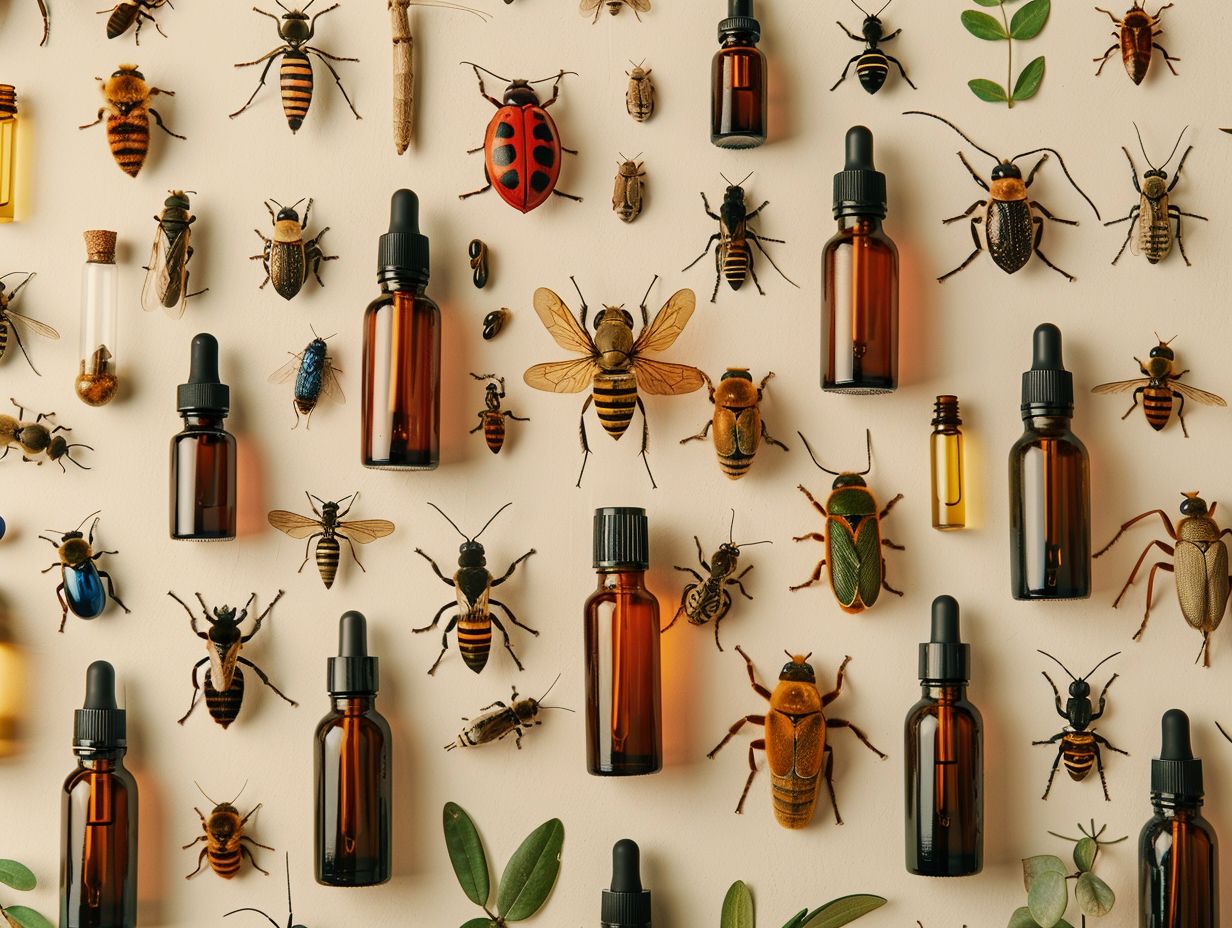
Peppermint essential oil is a versatile bug repellent that is particularly effective against fleas and ticks. Its minty aroma and insecticidal properties make it a valuable addition to homemade pest control solutions.
Peppermint essential oil acts as a natural deterrent for various pests due to its strong scent that repels insects. The active compounds in peppermint oil, such as menthol and limonene, disrupt the sensory receptors of pests, making it difficult for them to navigate or detect hosts. When used properly, this oil can create a protective barrier in your home against fleas and ticks, helping to keep your furry friends and family members safe from bites and infestations.
Lavender Essential Oil
Lavender essential oil is not only renowned for its calming aroma but also serves as a natural insect repellent against bed bugs, lice, and other crawling pests. Its soothing properties make it a popular choice for bug-free living spaces.
With its pleasant scent and insect-repelling qualities, lavender oil offers a holistic approach to pest control. For homeowners looking to deter bed bugs, a few drops of lavender oil on bedding and around the bed frame can help keep these pests at bay. Similarly, creating a DIY lice spray with diluted lavender oil and water can help prevent lice infestations, especially in households with children.
Incorporating lavender oil into homemade cleaning solutions can not only leave your home smelling fresh but also provide added protection against insects. Mixing lavender oil with water in a spray bottle makes for an effective all-natural insect repellent for countertops, floors, and other surfaces where pests may lurk.
Tea Tree Essential Oil
Tea tree essential oil is a potent insect repellent that effectively keeps mosquitoes and chiggers at bay. The antiseptic properties of tea tree oil also offer additional benefits in outdoor bug protection.
When applied topically, tea tree oil creates a strong barrier against pesky insects like mosquitoes and chiggers, preventing them from coming near. The antiseptic qualities of the oil not only deter bugs but also support skin health by cleansing and soothing any irritations caused by bug bites. This natural repellent is a safe and eco-friendly alternative to chemical bug sprays, making it a popular choice for those looking to avoid harsh chemicals in their insect repellents.
How to Use Essential Oils to Repel Bugs?
There are various methods to effectively use essential oils for repelling bugs. These include topical application on the skin, diffusing the oils into the air, and creating DIY bug sprays for personal and environmental protection.
When applying essential oils topically, it is important to dilute them with a carrier oil to prevent skin irritation. Some popular carrier oils include coconut oil, jojoba oil, or almond oil. Essential oils like citronella, eucalyptus, and tea tree are known for their bug repellent properties. Simply mix a few drops of these oils with a carrier oil and apply the mixture on pulse points or exposed skin.
For diffusing essential oils, consider using a diffuser to disperse the oils throughout your living space. Oils like lavender, peppermint, and lemongrass not only repel bugs but also create a pleasant aroma. This method is ideal for indoor bug control while promoting relaxation and a refreshing ambiance.
Topical Application
Topical application of essential oils involves directly applying diluted oils to the skin to create a protective barrier against insect bites. This method is ideal for personal bug protection during outdoor activities.
When applying essential oils topically for bug repellent, it is essential to dilute them with a carrier oil, such as coconut or jojoba oil, to prevent skin irritation.
- Citronella oil is a popular choice for repelling mosquitoes
- Lavender oil not only wards off bugs but also has a soothing effect on the skin
- Peppermint oil is effective against spiders and ants
The natural compounds in these oils act as natural insect repellents, avoiding the need for chemical-laden products.
Diffusing
“first_sentence”
Diffusing essential oils involves dispersing the aromatic molecules into the air using a diffuser. This method not only repels bugs but also creates a pleasant and insect-free environment suitable for relaxation and aromatherapy.
“continued_expansion”
In terms of bug control, certain essential oils are particularly effective. Peppermint oil is known to deter spiders, ants, and mosquitoes due to its strong scent. Lemongrass oil is a popular choice for repelling flies and other flying insects. Additionally, lavender oil not only keeps bugs at bay but also promotes relaxation and better sleep.
The practice of diffusing essential oils can have a significant impact on both bug prevention and mood enhancement in indoor spaces. The natural properties of these oils act as a barrier against pests while simultaneously uplifting moods and reducing stress levels.
“
Diffusing essential oils involves dispersing the aromatic molecules into the air using a diffuser. This method not only repels bugs but also creates a pleasant and insect-free environment suitable for relaxation and essential oils to kill bed bugs.
In terms of bug control, certain essential oils are particularly effective. Peppermint oil is known to deter spiders, ants, and mosquitoes due to its strong scent. Lemongrass oil is a popular choice for stink bug repellent and other flying insects. Additionally, lavender oil not only keeps bugs at bay but also promotes relaxation and better sleep.
The practice of diffusing essential oils can have a significant impact on both bug prevention and mood enhancement in indoor spaces. The natural properties of these oils act as a barrier against pests while simultaneously uplifting moods and reducing stress levels.
DIY Bug Spray
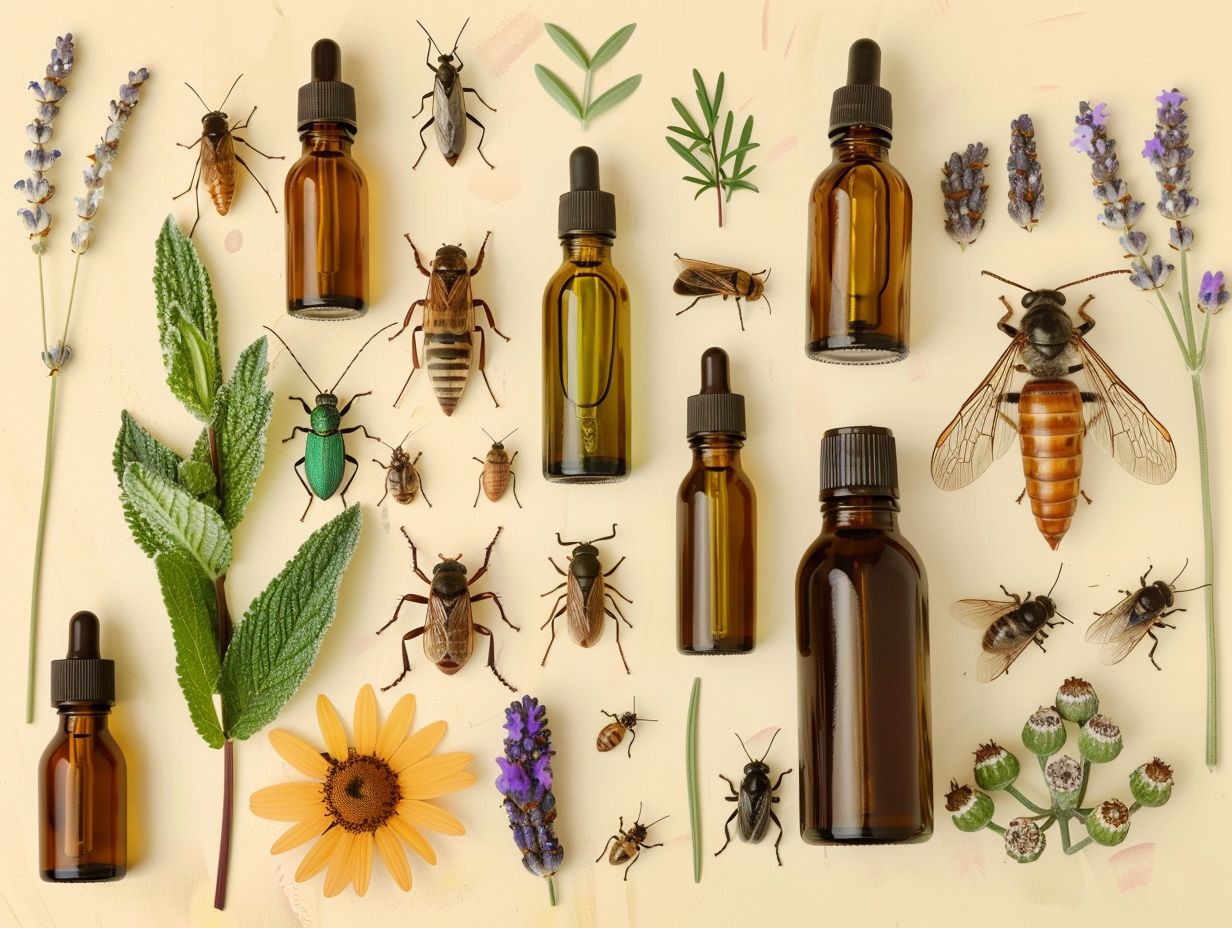
When making your own bug spray, consider using a blend of lavender, citronella, eucalyptus, and peppermint oils for maximum effectiveness against common pests such as mosquitoes and flies.
Application methods vary, but it’s generally recommended to shake the spray well before using and to apply it generously to exposed skin and clothing, avoiding sensitive areas like the eyes and mouth.
For storage, store your homemade bug repellent spray in a cool, dark place away from direct sunlight to maintain its potency. Consider using dark glass bottles to help preserve the oils and prolong the shelf life of your DIY insect repellent.
Are Essential Oils Safe for Repelling Bugs?
While essential oils are generally considered safe for bug repellent purposes, it is crucial to be aware of potential health risks and allergies associated with certain oils. Compared to chemical insecticides containing DEET, essential oils offer a safer alternative for bug control, especially around pets and in natural environments.
Essential oils derived from plants like citronella, lavender, peppermint, and eucalyptus contain natural compounds that repel insects without harsh chemicals. These oils are not only effective against mosquitoes, ticks, and fleas but also have aromatherapeutic benefits for humans. Essential oil bug repellents are biodegradable, making them environmentally friendly and safe to use in outdoor settings where synthetic chemicals can harm wildlife.
Precautions for Children and Pets
When using essential oils for bug control, it is essential to take precautions when applying them around children and pets. Some oils may pose risks to young kids and animals, so consult with a healthcare provider or veterinarian before using oils in households with children and pets.
Children and pets are more sensitive to certain essential oils due to their small size and developing systems, making it crucial to prioritize safety. Opting for child-friendly and pet-safe oils such as lavender, citronella, or cedarwood can provide effective bug repellent properties without harm.
It’s advisable to dilute essential oils properly before application and consider using diffusers or sprays in well-ventilated areas away from where children and pets play or sleep.
For personalized guidance on selecting the safest oils and application methods, seek advice from professionals who specialize in aromatherapy and pet care to ensure the well-being of your loved ones.
Precautions for Pregnant and Nursing Women
Pregnant and nursing women should exercise caution when using essential oils for bug repellent due to potential health risks to themselves and their babies. Certain oils may be contraindicated during pregnancy and lactation, so it is advisable to seek guidance from healthcare providers before using oils in these situations.
When pregnant or nursing, it’s crucial to prioritize the safety of both you and your little one.
Essential oils contain potent compounds that can cross the placenta or pass into breast milk, affecting the developing fetus or newborn. For instance, oils like pennyroyal, rosemary, and clove are known to be avoided during pregnancy due to their stimulating effects on the uterus, potentially leading to complications.
Instead of using conventional bug repellents, which often contain harmful chemicals, pregnant and nursing women can opt for natural alternatives. For example, wearing long sleeves and pants, using mosquito nets, and staying indoors during peak mosquito activity hours can effectively reduce the risk of bug bites without exposing you and your baby to unnecessary risks.
Other Natural Ways to Repel Bugs
Apart from essential oils, there are several other natural methods to repel bugs and create bug-free environments.
One of the eco-friendly approaches to bug control includes planting insect-repelling plants in your garden. By incorporating plants such as lavender, mint, and marigold, you can naturally deter pests. Utilizing natural bug repellent products derived from ingredients like neem oil or citronella can be effective in keeping bugs at bay. Practicing green cleaning habits, such as regular vacuuming, storing food properly, and fixing any leakages, can help in discouraging pest infestations.
Planting Bug-Repelling Plants
Planting bug-repelling plants like thyme and sage in outdoor spaces can naturally deter pests and create bug-free zones. These aromatic plants contain compounds that insects find unpleasant, serving as natural barriers against common bugs like mosquitoes and flies.
These bug-repelling plants add a touch of beauty and fragrance to your garden or outdoor area. Thyme, with its small leaves and delicate flowers, not only repels insects but also adds a savory flavor to your meals. Sage, known for its distinctive aroma, not only deters bugs but can also be used in cooking or for its medicinal properties.
When cultivating bug-repelling plants, ensure they receive adequate sunlight and well-drained soil. Regular pruning and deadheading can help maintain their health and vigor, enhancing their bug-deterring properties. Incorporating these plants into your landscaping can create a natural barrier, protecting your outdoor space from unwanted pests.
Using Natural Bug Repellents
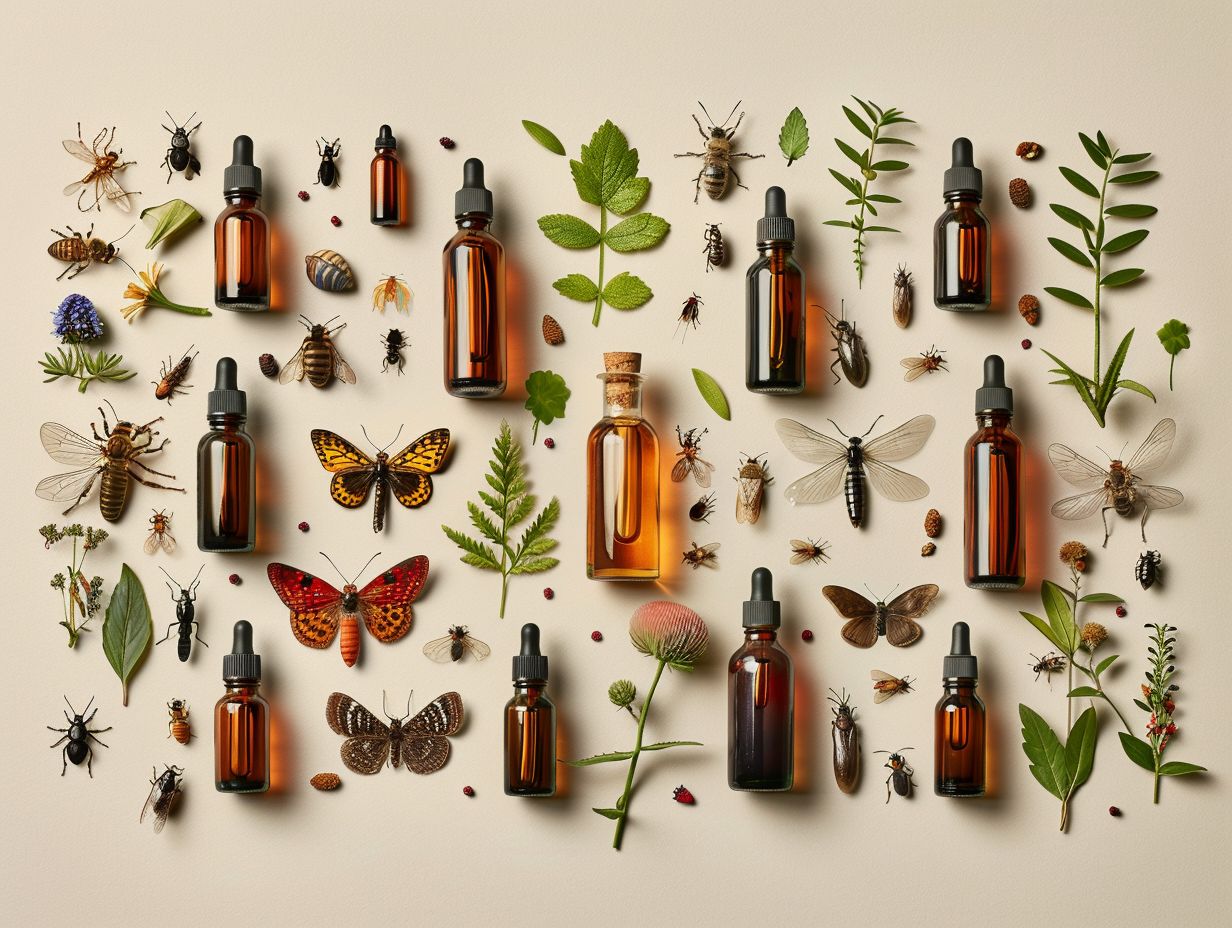
These plant-based bug repellents harness the power of nature to ward off insects without compromising on safety. Vetiver, a fragrant grass native to India, emits a scent that bugs find repulsive, making it an ideal choice for warding off unwelcome pests.
Bergamot, a citrus fruit known for its calming aroma, serves as a potent insect deterrent while infusing spaces with a refreshing scent. By incorporating these natural bug repellents into your home, you not only keep pests at bay but also contribute to a healthier environment without the need for toxic chemicals.
Keeping a Clean and Tidy Home
Maintaining a clean and tidy home is essential for bug prevention and pest control. Using natural cleaning products with scents like pine and implementing proper storage practices can discourage pests like moths and spiders from infesting living spaces.
In terms of bug control, cleanliness truly is key. Regular cleaning routines, especially with eco-friendly products like pine-scented cleaners, not only keep your home fresh but also deter unwanted critters from setting up camp. Organizing and decluttering areas prone to pest activity can significantly reduce the risk of infestations. Simple actions like sealing food properly, fixing any leaks, and sealing cracks can make your home less attractive to bugs seeking shelter and sustenance.
Frequently Asked Questions
What Essential Oils Keep Bugs Away?
There are several essential oils that can effectively repel bugs and insects, such as citronella, peppermint, lavender, tea tree, eucalyptus, and lemongrass.
How do Citronella and Peppermint Essential Oils Repel Bugs?
Citronella and peppermint oils contain strong scents that are unpleasant to bugs, making them effective at keeping them away. Bugs rely heavily on their sense of smell, so these oils can easily mask their usual scent trails.
Why is Lavender Essential Oil Great for Keeping Bugs Away?
Not only does lavender have a calming and soothing effect on humans, but it also has the same effect on bugs. Its aroma is known to deter bugs and insects, making it a popular choice for bug repellent.
Can Tea Tree Essential Oil Repel Mosquitoes?
Yes, tea tree oil has proven to be effective in repelling mosquitoes. Its strong scent and anti-inflammatory properties make it a great choice for keeping bugs at bay.
Is Eucalyptus Essential Oil Safe to Use around Children and Pets?
While eucalyptus oil is a great bug repellent, it should not be used around young children and pets as it can be toxic if ingested. It is best to opt for a milder essential oil alternative, such as lavender or citronella, when using around children and pets.
Why is Lemongrass Essential Oil Popular for Keeping Bugs Away?
Lemongrass essential oil contains citronellal, a compound that gives it a strong citrus scent that bugs find repulsive. It is also known to have antifungal and antibacterial properties, making it an all-around effective bug repellent.

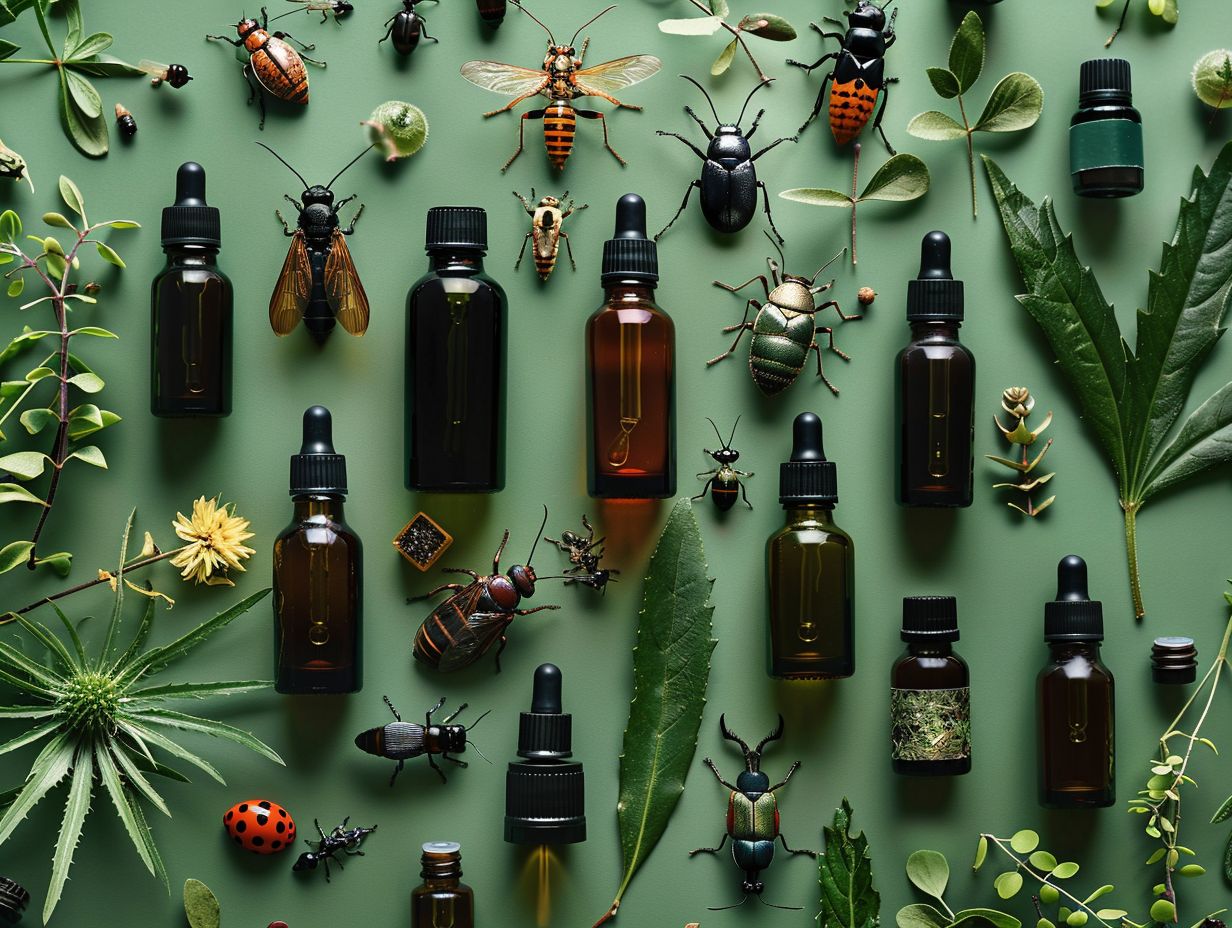
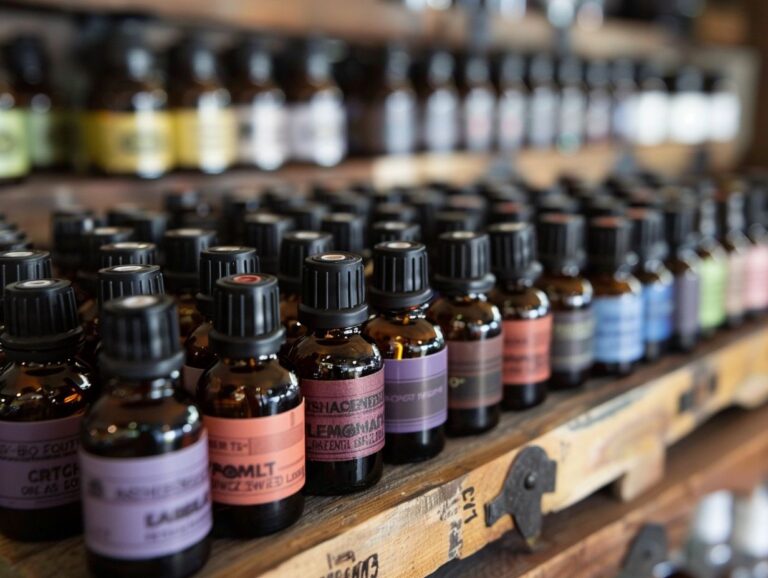
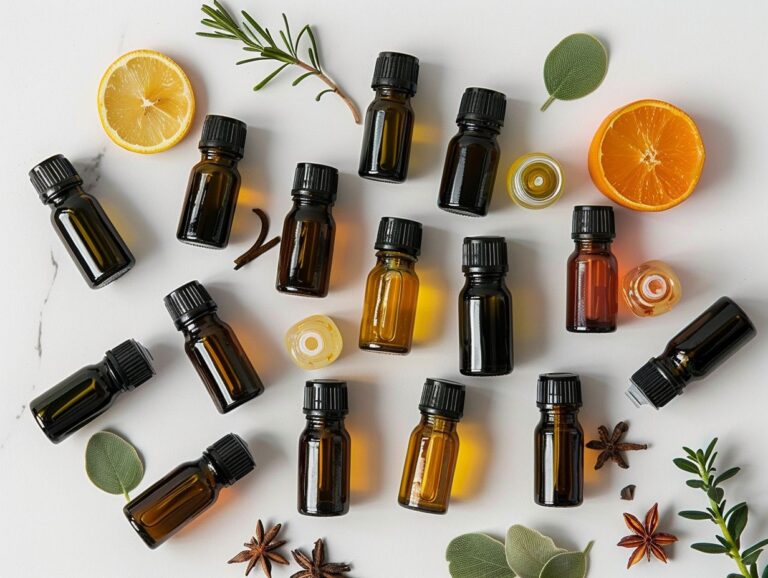
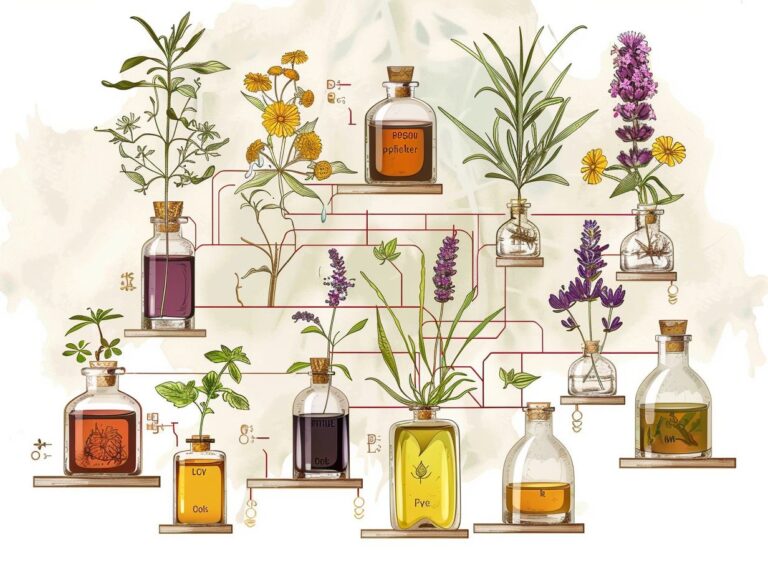

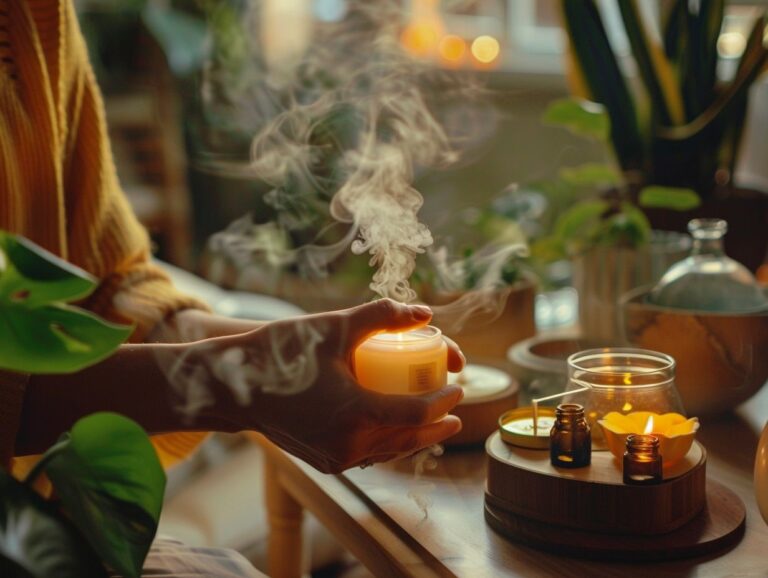
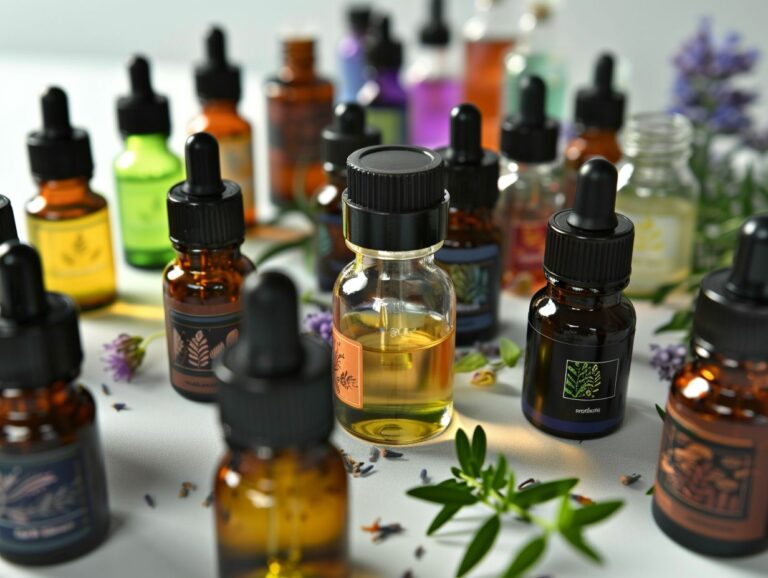
6 Comments